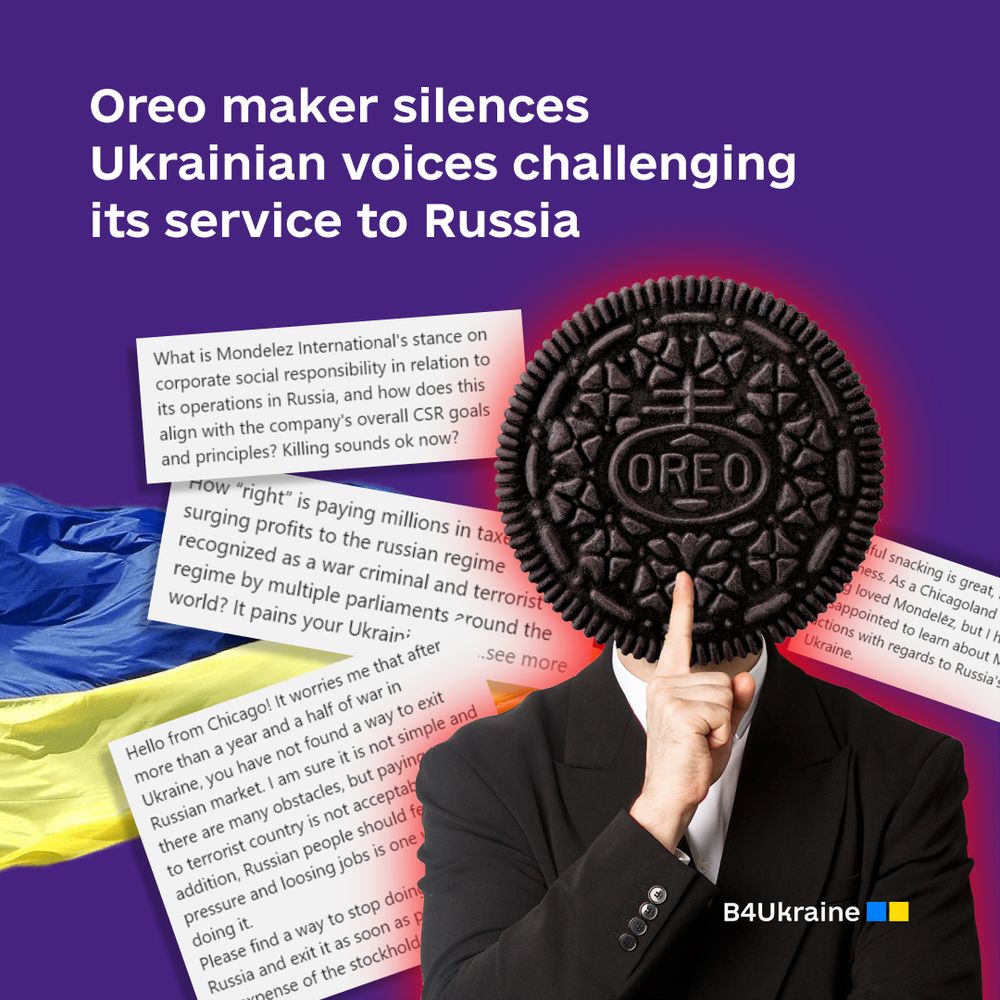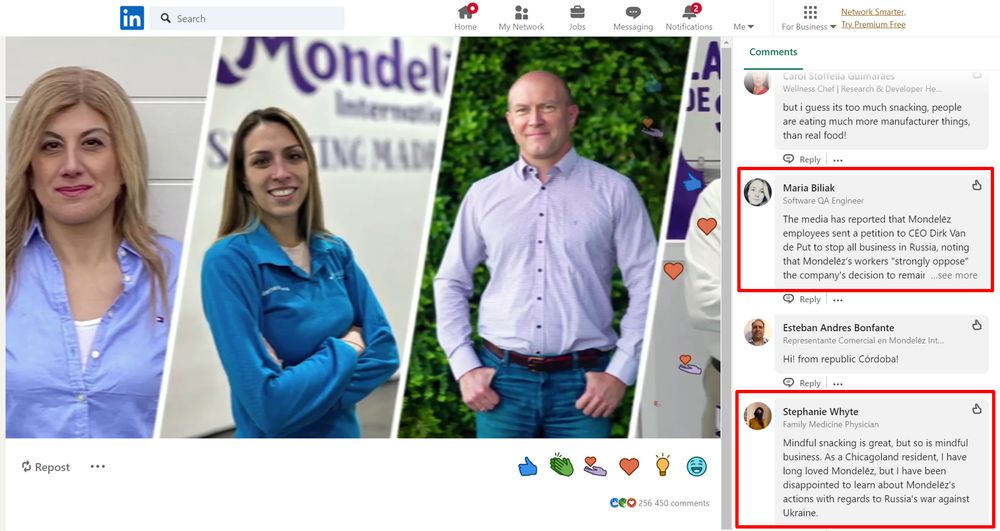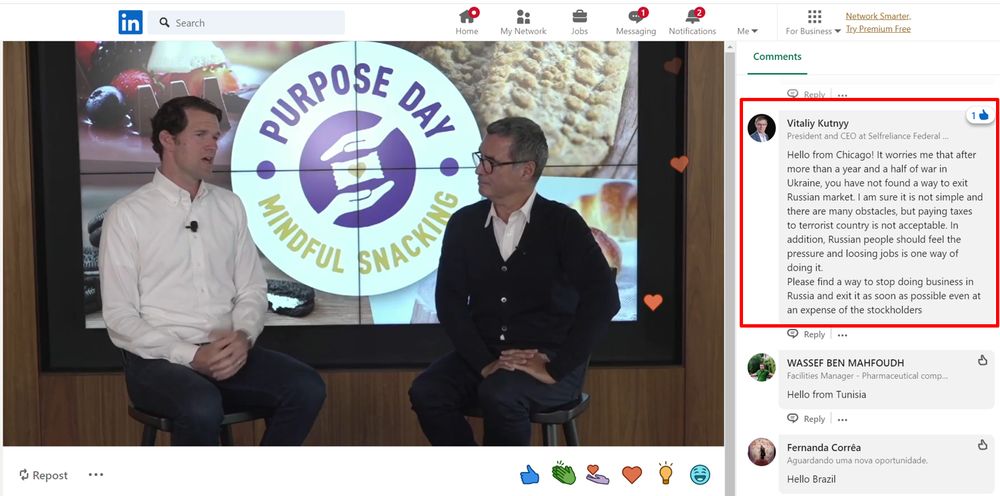
Mondelez International deletes “uncomfortable” questions and comments on its profitable business in Russia
On October 3rd the maker of the iconic Oreo cookie and Milka chocolate, Mondelez International, hosted its 2023 Purpose Day. The Chicago-based global food giant encouraged over 2.5 million of its international followers to pose questions on the company’s approach to “mindful snacking” hosted via a LinkedIn Live session. Contrary to the company’s expectations, an online opportunity for self promotion turned into a social media storm for an American snacking giant and one of the largest revenue generating western companies remaining in Russia. Caught by surprise, Mondelez’s speakers were faced with a mounting pile of questions on Mondelez’s contribution to the Russian war effort, 19 months since the start of the full-scale invasion of Ukraine and growing international pressure on the company to halt its business in the aggressor state.
What Actually Happened?
A visibly large number of questions on the topic of Mondelez’s business in Russia, its indirect financing of the Russian war effort, human rights due diligence and the company’s complicity in over 100,000 recorded war crimes came from various civil society activists globally and the Ukrainian diaspora representatives from the Chicago area.
“Hello from Chicago! It worries me that after more than a year and a half of war in Ukraine, you have not found a way to exit Russian market. I am sure it is not simple and there are many obstacles, but paying taxes to terrorist country is not acceptable. Russian people should feel the pressure and loosing jobs is one way of doing it. Please find a way to stop doing business in Russia and exit it as soon as possible even at an expense of the stockholders,” commented Vitaliy Kutnyy, President and CEO at Selfreliance Federal Credit Union.
According to B4Ukraine’s assessment, over 10% of all comments concerned Mondelez’s Russia businesses, which is significant considering a traditionally high number of non-substantive comments with emojis or simple “hellos” that such online formats attract.
As the Russia-related questions began attracting positive reactions from a wider audience, the company’s event moderator started to block users posting “uncomfortable” questions, a clear sign of Mondelez’s unwillingness to address its stance on the issue. While B4Ukraine has managed to retain limited visual evidence of such questions, the majority of them have been immediately deleted from the company’s page.
Such silencing actions demonstrate Mondelez’s lack of purpose when it comes to its Russian subsidiary, which last year generated 1.4 billion USD in revenue and 61 million USD in profit tax contributions to the Kremlin, thus prolonging Russia’s aggression against Ukraine.
Growing Pressure, Also At Home
Mondelez’s fear of public disclosure of its position on Russia seems unwarranted given its recent statement on the plans to make the Russia business “stand alone” with “a self-sufficient supply chain” by the end of this year. However, B4Ukraine’s internal sources highlight that the company leadership has turned the Russia operations question into a secret affair, most likely in order to avoid uncomfortable questions from its employees who have previously urged the company’s leadership to live up to its purpose, pursuing a clean exit from the Russian market.
According to the same source, Mondelez’s leadership finds itself under lingering pressure to rebuild its reputation and sales in the aftermath of B2B boycotts in Scandinavia. In June of this year, Mondelez had to confront a number of dissatisfied customers in the region - from national airlines and railway operators to national football associations and even IKEA - all of which decided to drop Mondelez from its list of suppliers, after the company had been designated “an international sponsor of war” by the Ukrainian government.
A visibly large number of the Ukrainian voices from Chicago attending Mondelez’s “Purpose Day” points to a growing degree of interest and engagement on this topic. In fact, such domestic pressure is likely to intensify in the weeks and months to come as the local community begins to challenge the extensive American corporate presence in Russia through public campaigns, media reports and an appeal to its congressional representatives. Ignoring or silencing such local voices from Chicago will prove to be more challenging than simply blocking their profiles or deleting their comments online. Mondelez’s leadership will be urged to engage with the local community in order to explain how it reconciles its corporate purpose with continued profitability in the aggressor state.

